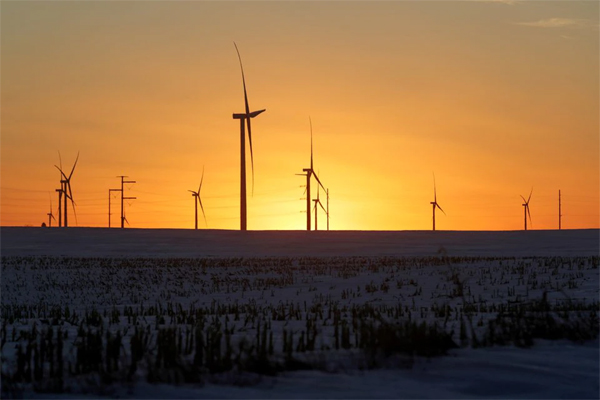
where agriculture and clean energy are key issues, in Latimer, Iowa, U.S.
Jonathan Ernst/Reuters
Reporting by Scott DiSavino/Reuters
NEW YORK
EnergiesNet 01 11 2022
A wind farm shares space with corn fields the day before the Iowa caucuses, where agriculture and clean energy are key issues, in Latimer, Iowa, U.S. February 2, 2020. Jonathan Ernst/File Photo
U.S. power usage will rise about 1% in 2022 as the economy recovers for a second year from 2020’s demand slump caused by the coronavirus pandemic, the U.S. Energy Information Administration (EIA) said on Tuesday.
In its Short-Term Energy Outlook (STEO), EIA projected power demand will climb from 3,932 billion kilowatt-hours (kWh) in 2021 to 3,956 billion kWh in 2022 and 4,010 billion kWh in 2023.
That compares with a coronavirus-depressed eight-year low of 3,856 billion kWh in 2020 and an all-time high of 4,003 billion kWh in 2018.
The EIA projected 2022 power sales would ease to 1,451 billion kWh for residential consumers, but rise to 1,345 billion kWh for commercial customers as more people return to offices and 1,014 billion kWh for industrials.
That compares with current all-time highs of 1,483 billion kWh in 2021 for residential consumers, 1,382 billion kWh in 2018 for commercial customers and 1,064 billion kWh in 2000 for industrials.
The EIA said natural gas’ share of power generation will slide from 37% in 2021 to 35% in 2022 and 34% in 2023 as gas prices rise. Coal’s share will slide from 23% in 2021 to 22% in 2022 and 2023.
The percentage of nuclear generation will hold at 20% in 2022 and 2023, the same as 2021. Renewables will rise from 20% in 2021 to 23% in 2022 and 24% in 2023.
The EIA projected 2022 natural gas sales would rise to 13.34 billion cubic feet per day (bcfd) for residential consumers, 9.25 bcfd for commercial customers and 23.22 bcfd for industrials, but fall to 28.84 bcfd for power generation.
That compares with all-time highs of 14.32 bcfd in 1996 for residential consumers, 9.63 bcfd in 2019 for commercial customers, 23.80 bcfd in 1973 for industrials and 31.75 bcfd in 2020 for power generation.Reporting by Scott DiSavino; Editing by Richard Chang
Reporting by Scott DiSavino; Editing by Richard Chang
reuters.com 01 11 2022









